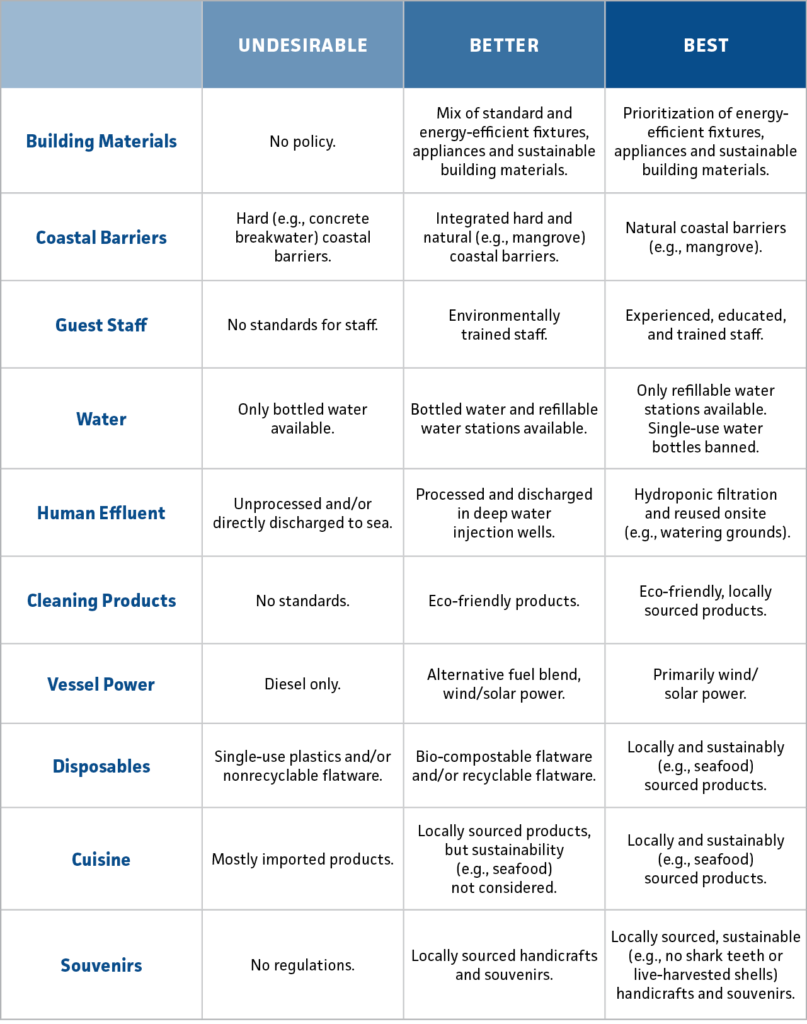Is coastal tourism in danger of going underwater?

The future isn't looking so rosy from here.
In late 2018, the United Nations’ Intergovernmental Panel on Climate Change scientists releaseda startling report关于温度升高的即将发生的影响。在我们目前的轨道上,与2040年工业前的水平相比,世界预计将使世界温暖2摄氏度。
For the coastal tourism industry, a 2-degree Celsius rise in temperatures would be catastrophic.
Many locations are already feeling the effects of a changing climate in the form of rising sea levels, an increase in dramatic weather events and noticeable shifts in weather patterns. As a recent example, due to increasing frequency of stronger weather systems, some government weather authorities have added a new classification for typhoons —"Super Typhoon"— surpassing the previously highest classification, Category 5.
Tourism businesses must plan now
为了避免到2040年温度的2度摄氏升高,到2030年,目前的CO2排放水平将需要减少约50%。对于旅游业,此截止日期仅超过当前10年业务计划的范围一年。换句话说,减轻和抵消气候变化的努力必须对行业利益相关者排名第一。
Current estimates suggest that around 80 percent of tourism is in coastal environments. This means that if the tourism industry and operators have not yet felt the impacts of climate change, they soon will as the effects in coastal areas are becoming increasingly apparent, with disappearing coastlines, more dramatic weather events, and noticeable shifts in precipitation patterns.
Some big industry players,such as Disney, have begun to act, realizing that changing climate will bring discomfort and disruption to their guests. The company has invested in large solar farms, switched transportation to biofuels, and is advancing strategic plans on how to reduce water waste.
Even the cruise industry, notorious for poor environmental standards, has taken action. For example,Hurtigruten Cruises, a Norwegian cruise operator, has banned single-use plastic on board and is aiming to power its ships with biogas in the near future.
Adaptive strategies
The benefits of undamaged coastal environments are numerous not only for their inhabitants, but also for their residents and visitors. For tourist operators, healthy coastal ecosystems are a big part of their business proposition, and researchershave documentedthe aesthetic value of a healthy marine ecosystem in coastal tourism. Other studies have suggested that tourists and visitors frequent coastal spaces for reasons that are more complex than simply seeking relaxation. Some tourists liken their travels to a form of spiritual devotion to a place.
Adopting a climate-inclusive management approach is critical to the long-term survival of the environment that the tourism sector depends on. Using sunscreen as an example, research has shown that many chemicals in traditional sunscreens kill corals, which are critical carbon sinks.
While far from comprehensive, these guidelines provide industry stakeholders with applicable strategies for mitigating CO2 emissions in a coastal context:
Many of these strategies have strong marketing value. The words "local" and "sustainable" are valuable marketing concepts. In addition, sustainable strategies such as best-practice coastal barriers can reduce long-term economic vulnerability. For example, a mangrove habitat, often destroyed to make room for coastal development, provides a natural and adaptive coastal barrier, which can reduce damage during extreme weather events. Compared to a hard, concrete-type barrier, a mangrove forest willgrow— this is especially important with the rising sea levels.
Adopting best practices also provides business opportunities. For example, not using plastic bottles and only offering water refills to guests creates an opportunity to sell sustainably sourced, reusable drinking containers.
A predictable, stable climate is foundational for the tourism industry, and proactive conservation strategies are becoming an expected component of the visitor experience. Those companies that invest in the environment can expect higher returns in the form of a greater customer base, longer-term profits and a more stable business.
This story first appeared on:

